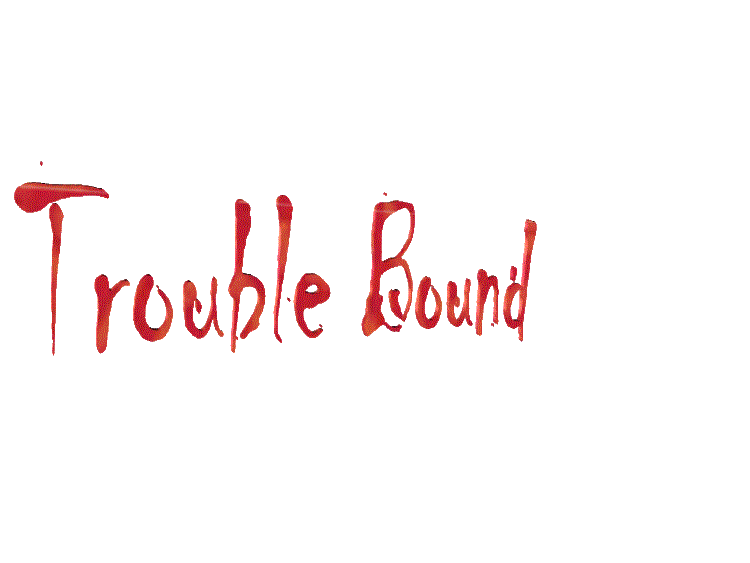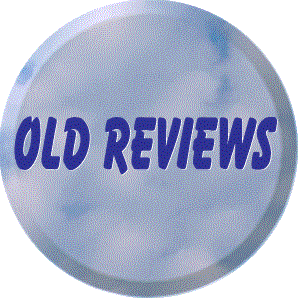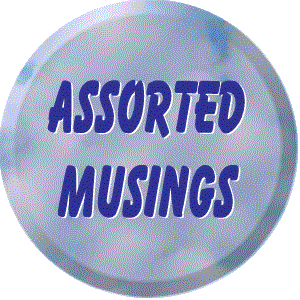
 |
 |
 |
 |
 |
 |
 |

|
This section will feature some short thoughts (and, occasionally longer essays) on issues in music, society, movies, sports, etc. All opinions are by Jim Brett, unless otherwise noted. Use the link above to view the email feedback I get; the interesting ones, anyway! Assorted Musings: OLD MUSINGS WHAT I DID ON MY SUMMER VACATION (Part. 2) While in Seattle this summer, I had occasion to visit the Experience Music Project, a kind of high tech, rock and roll museum. In summary, this is a great place to go if you are a music fan. It features an innovative architectural design and a superb use of technology (no surprise, since the founder is Paul Allen of Microsoft fame.) One drawback is that EMP focuses on American music, other than certain Special Exhibits. Now, ignoring French or Italian or Russian rock is not much of a problem, but you may have heard of a few artists from England and Ireland that have had a bit to do with great rock and roll. Start with the Northwest Passage, a tribute to the music native to the Pacific Northwest. This will let you learn how to use the Museum Exhibit Guide (MEG) device. It is basically a set of earphones attached to a power pack that you sling over your shoulder. You point a remote control device at an exhibit, and you can then listen to a description of what you are looking at. This could get to be annoying, if it were not done so well. The commentary on each exhibit rarely fails to shed more light on what you are viewing. While use of the MEGs are optional, I would strongly encourage you to use them (there is no extra charge; it is include in the $20 admission price.) Getting back to the Northwest Passage, this gallery starts and finishes nicely. The start looks at Louie Louie by the Kingsmen, and how that classic was created from the scene going on at the time in the area. Of course, the gallery finishes with a very comprehensive review of the 80s and 90s Seattle "grunge" scene. While much of this is familiar from the excessive coverage that Seattle received at the time, it is still cool to be viewing it right where it happened. However, since little of note happened in the Northwest between these two cultural and musical milestones (other than Hendrix, who we will discuss later), the middle part of the exhibit is devoted to the legendary, ground-breaking music of - Heart. Yes, Heart. Now, like most mid-40s rock fans, I liked Heart at one point when they first came out. And, I know that one of the Wilson sisters is married to the great movie director, Cameron Crowe (who captured the Seattle scene in Singles, which also had a great soundtrack.) But none of that warrants the excessive space dedicated to the dubious achievements of Heart. From here, I would go straight to the best exhibit at EMP, Milestones. This gallery covers the history of American rock, as best as it can be told while omitting the influence that British and Irish artists had. Starting off with the blues on one wall, and country on the other, the gallery provides a compelling demonstration of how the combination of these two genres birthed rock and roll. From there, things lag a bit until you reach outstanding sections on hip-hop, punk and the various indie rock scenes of the 80s and 90s. You could nearly spend an entire day in here, but instead let's head over to the Jimi Hendrix tribute room. While I am not much of a fan of the guitar gods, this was actually a very informative exhibit.. Their research has made for an enjoyable "Experience", even for those of us who are not Hendrix aficionados. They also have a Special Exhibit Gallery, which will focus on one musical strain. When I was there, it was Jamaican music, from ska to reggae. This was an entertaining and, yes, educational look at the roots of reggae music through to the latest Jamaican artists. It is strongest on describing how the music evolved, and weakest on Bob Marley - but everyone knows about him, anyway. You can see what it's all about at www.emplive.com, but nothing beats being there. So, if your travels bring you to the Seattle area, go see it. WHAT I DID ON MY SUMMER VACATION (Part. 1) I had a few concert experiences this summer to report on, including the rockabilly of Rosie Flores and the always interesting Mike Watt, this time with Lee Ranaldo of Sonic Youth. But first, I cannot pass up the opportunity to comment on my experience at the n*sync concert. Why, you ask, would I find myself at an n*sync concert? Well, remember that I am focused on all aspects of the popular music world, from the most esoteric and experimental sounds to the mainstream successes like n*sync. To fully appreciate the most accomplished and artistic albums from the truly inspired, one must have something of a less ambitious nature to compare with. Plus, my daughters made me take them. At this point, it would really be futile for me to comment on the music itself. It is clearly bad music, meant to be a fantasy soundtrack for young girls to listen to while watching handsome young men dance about amidst loud and flashy special effects. There has always been a place for this music, and, as long as there are young girls, there always will be. C'est la vie. As for the concert itself, it was long, with backing bands drawn from the second tier of mainstream pop. The crowd was generally enthusiastic, building up to a fever pitch by the time n*sync came on. The beer lines were longer than I expected, but apparently every parent present needed some fortification. There were big fireworks and explosions and video screens meant to impress crowds who have never seen a Pink Floyd or U2 concert. N*sync performed Bye Bye Bye, and it sounded exactly (and suspiciously) like it does on the radio. Out of 60,000 people at the show, we happened to be sitting directly in front of two 20-something guys who looked like they had been locked in a time warp from a Lynyrd Skynyrd concert at the same venue 25 years ago. Drinking heavily from before the first act started, they seemed as out of place as a couple of Budweisers in a cooler full of Pepsi. And the scariest part was that for the first half of n*sync's set, they were singing along - and seemed to know all the words! They were passed out during the finale. My daughters and my niece thought the concert was great. My brother, John, held his hands over his ears for n*sync's entire set. I didn't think it was quite that bad. On to more pleasing and rewarding experiences. I saw Rosie Flores at the Tractor Tavern in Seattle. This was a fine show, with Rosie and her band playing and singing a joyful rocking country sound. Her records are nice collections of songs, but do not do justice to her strong, clear voice that can stand up to any Nashville big-hair lady. She is also a fiery guitar player, ripping off solos that don't waste a note. Finally, I saw Mike Watt with Lee Ranaldo at Brownie's in New York. A packed crowd stood through an interesting and odd show. Mike Watt was the bass player for the legendary Minutemen, prior to a fine solo career. Lee Ranaldo is the guitarist for the equally legendary Sonic Youth. The room was full, and the crowd was equal measure older, leather-jacketed Minutemen fans and younger NYC hipsters. The first half of the show was 35 minutes of Mike Watt reading from James Joyce's Finnegan's Wake, while he and Ranaldo provided some background music. If any one else had tried this conceit, the crowd (not exactly a PBS, cappuccino demographic), would have been throwing beer bottles. However, Mike Watt has built up such a loyal, empathetic fan base that his every whim was indulged. After finishing this opening, Watt told the crowd, "Thanks for putting up with that." A burly, balding fellow in a leather jacket yelled out, "Thank you, Mike!" It was all made right in the next 45 minutes as a drummer came on and the three proceeded to cover virtually all of the Stooges' Funhouse (see Retro Reviews). This was a perfect choice for Watt, since the bass on Funhouse is virtually a lead instrument, and Watt did not have to strain his admittedly thin vocals to do a good snarling Iggy Pop imitation. A very enjoyable show that reminded me how good Funhouse was, and how good Mike Watt is.
TroubleBound visits with Caithlin De Marrais of Rainer Maria
[In our reviews
section recently, we assessed the compilation Freedom Sings, issued by
the First Amendment Center. Here are excerpts from our interview with
Ken Paulson, Executive Director of the Center.]
TroubleBound: Ken, what are
the motivations for the artists who contribute their time and talents to the
Freedom Sings series of concerts?
Ken Paulson: Bill Lloyd
is the Music Director for the First Amendment Center, and is one of the most
well-liked and versatile musicians in Nashville. As he recruited other
musicians to appear at the concerts, some of the artists came because they
believed in our message; others came because they owed Bill a favor.
However, even those musicians have come back again, because they developed an
appreciation of what we were trying to do. The CD has been released to
further awareness of First Amendment issues.
TB: What are the
goals of the First Amendment Center?
KP: Our goal is to
remind Americans that the First Amendment is a right of free speech for the
people - not just to protect the press and politicians. Our research shows
that one in 5 Americans surveyed said that the First Amendment goes too far.
We want people to know that these freedoms are for them, and the theatre,
dance and music they make and enjoy.
TB: The First Amendment
Center appears to address First Amendment issues from both ends of the
political spectrum. Is this important to help achieve your goals?
KP: This is important to
us. Our culture comes from journalism, as opposed to a traditional
advocacy group approach. We are dedicated to being even-handed, not
heavy-handed.
TB: Some of the hottest
free speech issues today revolve around rock and rap lyrics, with even
traditionally liberal critics contending they go too far. Eminem has
been the highest profile example of this. What are your observations
regarding the controversy?
KP: Eminem's themes are
familiar ones of violent and sexual imagery. There is nothing in his
songs that has not already been shown in a Quentin Tarantino movie.
There would not be any question of censoring a movie like Pulp Fiction,
but rock and roll has usually been viewed as a lesser art form, something just
for the kids. This makes it easier to attempt to censor. I'm
not a fan of Eminem, but clearly his music is protected by the First
Amendment.
TB: The Freedom Sings CD
showcases a wide variety of songs, ranging from Annie Had a Baby
from the 1950s to Fight the Power from the 1990s.
KP: That enables us to
provide the perspective that time can provide. Many of the songs that
were controversial in their day no longer provoke outrage. I bet you
that sometime in 2020 you will hear Eminem on an elevator, and say "Hey,
isn't that Slim Shady?"
TB: What do you say to
those who claim that there is no good music being made today, or that things
are not like they were in the 60s?
KP: I would tell them
that they must not be listening to Steve Earle, Iris DeMent, Bill Lloyd and
others of their caliber. There is plenty of great music with the same
great values and sound.
That said, I do think that music is different today. It is more
fragmented, and not as universal. When people of our generation hear the
opening chords of a song like Ohio, as done on the Freedom Sings CD, we
all know the song and have a shared understanding of it. Today, someone
may be well-versed in hip-hop, or in jazz, or in alternative country, or some
other music niche, but we are not easily exposed to other forms.
Artists are also less willing to take risks. I like to point out to
people that in the 60s, both Eve of Destruction, and the Ballad of
the Green Beret were Number 1 hits. Both were political songs, although
from opposite ends of the political spectrum, and both were hits.
It is hard to remember the last Number 1 hit that was politically oriented.
TB: What are some of the
new initiatives of the First Amendment Center?
KP: The First Amendment
Center and ASCD — the Association for Supervision and Curriculum Development
— have launched First Amendment Schools, a nationwide initiative to
transform how public schools model and teach students the rights and
responsibilities of the First Amendment and citizenship in a democracy.
The goals of the project are to:
Our thanks to Ken for the interview. To learn more about the activities of the First Amendment Center, go to their web site - http://www.freedomforum.org/first/ 1/3 Assorted Musings - While we do not have a Top Ten of 2000 list at TroubleBound, it is not due to any lack of worthy music. We just do not feel the need to pander to the public's obsession with list-making. Can't we just enjoy the good music that is out there, without turning everything into a competition? OK, we just never got around to compiling such a list. Sorry. If you buy Steve Earle, PJ Harvey, Yo La Tengo, Handsome Family, Eleventh Dream Day, Sleater-Kinney and Smashing Pumpkins, you have a good start on the best recordings last year. Many critics bemoan the dominance over the last couple years of teeny-pop appealing to girls, and rock/rap appealing to boys. I have no love for the Britneys and Limps Bizkit of the pop music world. But the wailing strikes me as an overly negative assessment of the true state of music. During most periods of time in the nearly fifty years of rock music, the most popular music was not the "best", most critically acclaimed music. Some see this as proof of the poor taste of American music consumers. I see it as the normal result of the fact that, for the vast majority of people, music is no more than the backing soundtrack of some moments of their lives. Through the teen years, the most overpowering emotions revolve around developing sexuality. For teen boys, that means the music must meet their fantasies of power and noise, thus offending adults, while at the same time leaving unchallenged their fragile assumptions about life, which will be shattered by reality sometime between 17 and 23. I know this, for I was once a teen boy myself. For teen girls, it means the music must meet their fantasies of love and nurture outside their family, while at the same time leaving unchallenged their fragile assumptions about life, which will be shattered by reality sometime between 17 and 23. I guess this, from observing my sisters and daughters. Once we are through our teens, music becomes even less of a focus for most of us. We are starting jobs, thinking about marriage and family and money. Popular music does not typically revolve around these concerns. So, our musical taste remains focused on the stuff we grew up with in our teens and early twenties, with the occasional catchy new tune on the radio that we like for a few months. (None of this, however, explains Sting.) Is this overly generalized? Of course it is. There are many who do not fall into this simplistic analysis. However, I believe that it is a useful way of explaining why so many talentless performers and promoters get rich - they know where the money is. And it is not with me or you or the rest of those for whom music is a central facet of our lives. There just are not enough of us. There are those few lucky artists (from the Beatles/Stones/Who to Beck and Smashing Pumpkins) who are able to become rich, while making truly great music. Always, there will be more great artists who will struggle to get their music heard, and never make more than a modest living from their work. This will never prevent the best from continuing to make music, because that is what they do and a large part of who they are. Today, there are additional avenues for these artists to reach an audience. While the Napster file sharing model is not the final answer, it has demonstrated that other ways exist for music to be distributed. Does Napster facilitate the unauthorized use of music by all artists? Yes, but the artists who lose the most are those who already have the most, from Metallica to Rage Against the Machine and Britney Spears. These are among the most downloaded performers on Napster, not the independent artists who continue to make the most vital music for a small audience. Technological developments insure that these artists will always find a way to make their music available, if not profitable. I do not know where the music business will go next year, nor do I really care. What I do know is that there will be great records next year by my favorite artists, plus plenty by new performers that I have yet to hear about. Until they pry the guitar (or drumsticks, keyboard, fiddle, mixing board or turntable) from the cold, dead hands of these bands, you and I will continue to be able to discover new and fulfilling music.
So, let the masses have their Insane Clown Posses and N'Syncs. We have
something better; a lifelong love affair with great music.
10/10 Assorted Musings - Presidential elections just keep
getting more and more depressing. The Republican is a spoiled rich kid,
with no apparent command of the issues or import of the office, who has lived a
charmed life because of who his father is. The Democrat is a spoiled rich
kid, with an eerie habit of exaggerating virtually every accomplishment, who has
a very ugly willingness to attack anyone with anything, damn the truth.
Then we have Buchanan and Nader, lunatics of the right and left. Ah, well,
you still have to vote for somebody. To see who you line up with on the
issues, go to www.speakout.com and
click on the VoteMatch Presidential Selector, or go to www.rateyourself.com.
While much of your selection process is (and should be) subjective, these tools
give you a starting point to see who you should vote for just on the issues
identified. My results were a fairly accurate reflection of my political
leanings. 9/18 Assorted Musings - As a user of Napster and a strong
supporter of intellectual property rights, I would like to weigh in on the
current controversy. For the uninitiated, let me describe the
service. A computer user goes to the Napster web site, downloads and
installs the software. This entire process takes only minutes with a high
speed Internet connection. Launching the Napster software connects you to
hundreds of thousands of songs that are stored on other Napster users'
computers. You then have to merely search for the songs you want, and
click to download them from other users. This is one of the easiest and
most effective software programs I have seen; although it can be very
frustrating without a high speed Internet connection.
While I concede, as argued by the music industry, that it is likely that the
(vast?) majority of Napster users are gleefully grabbing gobs of free stuff, let
me point out what I believe are some legitimate uses of the software.
Most importantly, my primary use of Napster has been to make copies of songs
that I have previously purchased in the LP or tape format. It has long
aggravated me that the record companies (and artists, let's not let them off the
hook) force me to pay full price for a CD of material that I have already paid
for. They say they have no problem with me taping a CD I own to play in my car
cassette player. If the record industry had come up with a solution, whereby I
could bring an old LP into a store and receive the same work in CD format at
cost (like, $2-3), I would gladly support the end of Napster. Until they
address this issue, I refuse to get worked up about artist rights. Also, if they offered to sell single tracks at $1-2 (rather than $4-5 as CD
singles), I would be more sympathetic. Soooo many times, I have coughed up $15
for a CD, where I end up liking one or two songs. Finally, why is the music business not all worked up about my local library,
where I can check out a wide variety of music (including, yes, Metallica's more
recent and decidedly inferior CDs). I know the scale is vastly different, but
are we crusading for the suffering artist's rights, or are we merely trying to
protect the huge markups on CDs? Life can be full of gray areas, and Napster is certainly that. Having said all this, there are two final points that I am sure about. First,
it is just plain wrong to download and keep or reproduce songs that you have not
paid for. Second, Napster may be defeated in the courts, but they have
already won in the marketplace. There will be no stopping the technology
of file sharing. Thus, the music industry must figure out how to use
it. - So, the Smashing Pumpkins go out in a
blaze of glory with a free on-line distribution of Machina II, consisting
of odds and sods from their last recording sessions. We at TroubleBound
have dutifully downloaded the songs (available at www.metrochicago.com,
among other places), and will have a review shortly. Give Billy Corgan
credit; I don't know if he is less greedy than Metallica, but he sure can play
the PR game better. First listen would support that he also has far better
musical ideas and execution. 3/24 Assorted Musings - I read that Nine Inch Nails' The Fragile is considered to be a disappointment commercially. This does not surprise me given the almost total lack of radio airplay on Chicago's popular "alternative" radio station, Q101. It is sad to see them abandon an artist who is responsible for a great deal of the popularity of the format, and who has released such a powerful record. It is true that the lyrical content prevents certain songs from garnering airplay. Still, the relative lack of success for The Fragile, compared to (the inferior, though more popular) The Downward Spiral, is the final nail in the coffin of the strange confluence of quality and popularity that was present in rock for a time in the 90s. - In reviewing the Clash live record , it occurred to me that they had a perfect band name - short, simple yet completely descriptive of both their philosophy and musical style. Another example that comes to mind is Public Enemy. There are great bands with stupid names (The Beatles being the most obvious), and there are probably bad bands with good names. Any suggestions from y'all?
- In late December, Jim DeRogatis of the Sun-Times
published his selection of the key artists of rock's first half-century.
They were, in chronological order - Chuck Berry, James Brown, Bob Dylan, the
Beatles, The Rolling Stones, The Velvet Underground, Black Sabbath, Patti Smith,
the Ramones and Nirvana. Try as I might, I found it hard to dispute many
of these.
I
"might" substitute the Clash for Patti Smith or Black Sabbath, but his
logic for selecting them was good. As someone who is generally not a metal fan,
Black Sabbath is a better selection than Led Zeppelin. I never would have
admitted this (and didn't truly recognize it) back in their heyday in the 70s,
but Sabbath's sound was truly innovative, as opposed to Zep, which these days
mostly sounds like Page and Plant showing off. My second
"ten" would be the Clash, Johnny Cash, Prince, the Beach Boys, Neil
Young, Bob Mould/Husker Du, Public Enemy, Bob Marley, the Who, REM.
Opinions from others are welcome, as always! - I bought the newly-released DVD of
Apocalypse Now. This may be my all-time favorite movie, and it does not
disappoint on DVD. The opening sequence is spectacular, with The End
(or whatever the song's name is) by the Doors capturing the mood
perfectly. The film is really a collection of specific set pieces, held
together by Martin Sheen's character. His captain is crazy in the
beginning, goes through hell, and comes out finally sane (I think). Robert
Duvall's gung-ho character is something to see ("I love the smell of napalm
in the morning - smells like - victory"), and Sheen's observation that
"he'll come out of this without a scratch" tells you all you need to
know about Duvall. If you haven't seen this in awhile, rent it today. - I bought the DVD of Stop Making Sense, the concert movie featuring the Talking Heads and directed by Jonathon Demme. Until I saw this again, I had forgotten how good the Talking Heads were at the time of this movie. Their first few records were good, if a bit sterile. Then, with Speaking in Tongues, they broadened their sound, and, for a time, became one of the best bands. Their falloff was not gradual, and is typically blamed on David Byrne's fascination with world music, and his personal alienation from other band members. But, for this concert, all of the best elements of the band are present. Their art school background contributes to the visual style of the movie, which is always engaging, often stunning. That same background had occasionally hurt their music, as they appeared very focused on the "grand idea" of the song, and how clever they were, at the expense of providing a satisfying experience to the listener. In the movie, their music is relieved of that burden, and the band seems positively liberated. The camera repeatedly shows band members smiling and playfully interacting with each other. They are having as much fun as we are. Burning Down the House does just that in a version that all but requires you to get up and dance. David Byrne, never the greatest vocalist, is augmented through most of the movie by two excellent backup singers. The movie starts with a solo acoustic version of Psycho Killer by David Byrne that does a great job of highlighting the best of the old, spare Talking Heads. Gradually, through the next several songs, the entire band comes on stage. The combination of a killer band completely in their groove with David Byrne as an always fascinating focal point is exhilarating. A personal favorite is Naive Melody (This Must Be the Place). You've got to see Byrne dancing with the floor lamp. Rent this movie! - I recently spent a few days in Las Vegas, and am pleased to give you the following report. - I broke even at roulette and Let It Ride, never won a thing at craps, and had more losing than winning sessions at blackjack. Net, it was not my best trip at the tables, but not a disaster. - I had previously stayed at MGM Grand (nice hotel) and the Monte Carlo (even nicer). This trip I spent the first vacation part of the trip at Mandalay Bay. An excellent hotel, with a large and enjoyable Wave pool to lure you away from the tables for awhile. I would strongly recommend this hotel for anyone looking to stay in an upscale, yet lively Vegas property. - On Friday night, I saved my money and instead went with my brother-in-law Paul to the Rum Jungle nightclub at Mandalay Bay. We were Livin' La Vida Loca! Seriously, it appears that Latin music is really hot right now. - The Excalibur has a Krispy Kreme bakery, just the thing for that early morning pick-me-up! - Based on several visits, my favorite place for gambling and fun is the Rio. The Voodoo Lounge is a fun place to hang out. Its only downside is that it is not on the Strip, but I'll have to stay there sometime. - Brought my golf clubs and never golfed. Felt better when the cabbie on the way back to the airport told us that 50% of those who bring their clubs never play. - My brother-in-law Paul files this (slightly edited) report: - This was my third trip to Las Vegas in a year, so naturally the first time thrill is gone. But needless to say, this particular trip was great for clubbing. Mandalay Bay is a beautiful hotel and I would highly recommend it to anyone. The pool area is probably one of the better ones and from the amount of time Bob, Tom and Richie spent girl watching, you know that the sights are just as good. My trip was once again gambling free, so I don't have any good tales about winning, losing or what casinos I liked best. But I can give you a low-down on some of the hot night spots. My first night out (Friday) was with my favorite brother-in-law Jim Brett. Nobody wanted to join us so we stayed in the hotel and hit the world famous Rum Jungle. It probably wouldn't be my type of bar back home, but in Vegas you have to take what options you have and go with it. The bar plays a lot of techno music which is very annoying to me but its actually a blast to watch the weirdoes dancing (Ed. Note - Techno is not annoying to me for the first couple of hours, and I believe that Rum Jungle had more variety than your average night club.) Jim and I hung out at the bar and many girls came up to us and tried very hard to pick us up (Ed. Note - yeah, right) I rate the Rum Jungle a C+. (Ed. Note - B) The next night Scott and I went to the Voodoo Lounge which is on the top of the Rio. Anyone looking for a spot to go to should definitely visit the Voodoo. I probably saw one of the best bar bands ever. I also met a bunch of girls from Minnesota and ended up bringing them down to Rio's other night club. Stay away from this one (Club Rio). Its another Techno bar. Sunday night I hit my old standby - the Beach. Its a stand alone bar located near the Stratosphere. This bar is a blast. The music is more top 40 and has a huge dance floor with more normal people (well, as normal as you can get in Vegas). At 2:00 there is a wet t-shirt contest which is very entertaining and it doesn't cost you an arm and leg like the other clubs. - I ordered some stuff from CDNow and was happy with their selection and prices. However, they took the CDs that I ordered (NIN, Freakwater, Minutemen and other similar artists), and sent me e-mails recommending what they think I might like - new releases by Stone Temple Pilots (gulp!), Live, Indigo Girls and Puff Daddy. Not a one that interests me; their relational database needs some work. - The September issue of Spin proposed their 90 greatest albums of the '90s. You have already seen my top 16 in the old reviews section of this site. Here are my comments on Spin's list: >> Like many reviewers and my cousin Mark, they tend to dismiss live albums and multi-artist soundtracks, both of which are well-represented on my list. I'm not sure why. >> Nirvana's Nevermind is their #1 album; while I preferred the live record, this is a very worthy choice. It brought rock music back to the forefront for a while, until it once more gave way to hip-hop in the public consciousness. >> As expected, the list is over-run with rap and electronic/techno/trip- hop. This is music that is cool for rock critics to like, in order to show how open minded they are. Most of this is overrated. Having said that, their #2 album is Fear of a Black Planet, by Public Enemy. Just as the Clash was touted as the "only band that mattered" back in the punk heyday, Public Enemy is the only band that mattered in the hip-hop days. The music they made in the late 80s and early 90s puts the current generation of rappers to shame. >> # 3 is to Bring You My Love (PJ Harvey - my grade was B+), #4 is Odelay (beck - my grade was A+), #5 is Slanted and Enchanted (Pavement - my grade was B), # 6 is Live Through This (Hole - my grade was A+). All are worthy selections. # 7 (Bjork) and # 8 (Dr. Dre) are unheard by me, but I have been unimpressed by other music I have heard from them. # 9 is OK Computer (Radiohead - my grade was A-; this record is also highly touted by my brother-in-law, Pete Hadjis). #10 is Dig Your Own Hole (Chemical Brothers - my grade was B+). >> Other notables deservedly on the list include my No. 1 Exile in Guyville by Liz Phair (Spin #13);Nirvana's underrated In Utero at # 18; Smashing Pumpkins' Siamese Dream at #23; Rage Against the Machine at # 26; Bob Dylan's Time Out of Mind at # 29; Cornershop's When I Was Born for the 7th Time at #34; Fugazi's Repeater at #36; PJ Harvey's Rid of Me at #37; The Breeders' Last Splash at #39; R.E.M.'s Automatic for the People at # 40; Sinead O'Connor's I Do Not Want What I Haven't Got at #44; Red Hot Chili Peppers' BloodSugarSexMagik at # 58; Lucinda Williams' Car Wheels on a Gravel Road at #61; Steve Earle's I Feel Alright at #75; Yo La Tengo's I Can Hear the Heart Beating As One at #78. If you get these records, plus the others in my Top 16, you will have a fine 90s collection. >> Why are these people on the list at all? Bjork, Tori Amos, U2, Stereolab, Prodigy, Elliot Smith, the Boredoms and Oasis.? >> At least they left Alanis Morissette off the list! >> Best comments I noted in the write-ups: Courtney Love notes that record company Geffen didn't get the change that Nirvana had really brought about; "there was no sense that the values had changed. Top 40 was getting obsolete... you could do what you wanted. And you still can" Rock on, Courtney! Also, critic Eric Weisbard does a nice job dissecting Nine Inch Nails on his notes on The Downward Spiral (overrated at #11) - "Reznor's embrace of the extreme could seem disturbingly manipulative, but his anger was real. The results, drawn in part from Ministry's work in the 80s but far more grand and personal, synthesized a new brand of rock'n'roll rocket fuel" Very nice to see Ministry get the credit they are due, even if they won't get Reznor's money and fame. >> Finally, speaking of money and fame, this quote from the loutish Noel Gallagher of Oasis - "people tell me that whenever they hear Wonderwall, it transports them back in time to when they first heard it, which is all you can ask for from a record; that and a big (bleepin') car and house." - I heard a snippet of an interview with Ian Anderson of Jethro Tull on WXRT. He made a great comment, which I will attempt to paraphrase here. He said "While I love it that people buy our new CDs and come to our shows, it depresses me to see so many young people at our shows. We are not the future of rock and roll; we are the past. Young people should not be listening to us, but to the music that is defining the future." I am heartened to hear these comments, since I have always found it discouraging when young people (under 30) listen to "classic rock." Listen to new stuff! Stay young! - I just finished a decent book about the Clash by a former roadie, graduated to band manager. A Riot of Our Own, by Johnny Green, gives some insights into the greatness of the Clash, and one can deduce why none of the principals has approached the group success in any of their individual endeavors. Joe Strummer comes off as the most thoughtful of the band, but Mick Jones is the one who dared to see how the Clash would eclipse the Sex Pistols, and transcend punk. The book is a little hard for us Yanks to read, with no attempt to soften the British slang. While there is certainly substance abuse and typical band misbehaviour described here, it is not a gossipy book; that is, no terribly disgusting rock star behavior like Led Zeppelin, Jim Morrison, etc. - The recent Flaming Lips album is a tremendously ambitious success. Listening to the record, I marveled at how rarely I hear artists reaching for something truly new, and even more rare for it to succeed. Most of my favorite music is inspired within its own genre (Steve Earle, Bob Mould), or across a couple of genres (Wilco, Beth Orton, Yo La Tengo.) The music that has stood up over the years for me is not the "concept" albums of my youth (Lamb Lies Down on Broadway, Thick as a Brick), but the albums from guys who just wrote great songs (Rolling Stones on Sticky Fingers and Exile on Main Street, early Clash, X, R.E.M.) My guess is that people who start a rock band and begin to write their own songs fall into two camps. One group is guys who love the music and the lifestyle, and imitate their heroes. If they get real good at it, they become more than cover bands, and begin to craft inspired music that thoughtfully builds on the best of their predecessors. The other group is art school loners, who are seeking an outlet that they have not found in painting, poetry, etc. These guys, or sometimes women, want the world to see and validate their creativity. As such, they are determined to do something different - MAKE A BOLD STATEMENT! LOOK AT ME, I'M CREATIVE! The first group is only saying, "Look at me, I'm loud!" Now, the time when things get messed up is when guys in the first group try to be like guys in the second group. When heavy metal guys decide that they want to have a "concept" beyond "bigger, louder and faster"," we are heading quickly to Spinal Tap territory. The album by Soil reviewed here is an example of some of the best of metal - proficient musicianship and impeccable production - along with some of the pitfalls of metal ambition - lyrics that are almost laughable. Another problem, particular to the "artistic" contingent is trying too hard. They are competing to make music that is not just better than other rockers, but also gets the respect of classical/opera music fans, Genesis and Zappa fans. Why? Who knows. Go join the Chicago Symphony if that is what you are after. I just want to rock and roll all night! The album by Deja VooDoo is somewhat of an example of this problem. He feels like he needs to show everything he knows in the one hour of music on the CD. Some of it works, but only when he relaxes at the end of the CD does he produce a truly great song (Purple Ladybug). Ah, but when the ambition is met by the achievement, as on the Flaming Lips record (and to lesser extent, the Red Star Belgrade record), it can be stunning. There are better albums than this, most by the first group of rockers, who focus on writing good songs rather than making a great "concept" record. But, there are few better experiences for a music fan than to hear something new that works so impressively. It renews my faith that the "artistic" groups can make music that opens new doors, but is also just plain fun to listen to! - Axl Rose is on the cover of the July Spin, and is the subject of a fascinating article. I was never a fan of Guns'N'Roses, but Sweet Child of Mine and Paradise City are two of the towering achievements in hard rock history. Not since Humble Pie's 30 Days in the Hole and Hot and Nasty have a pair of songs been so sleazy, greasy and tremendously melodic.
| ||||